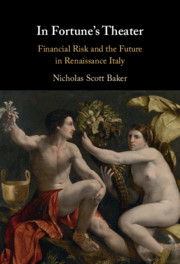Book contents
- In Fortune’s Theater
- In Fortune’s Theater
- Copyright page
- Contents
- Figures
- Preface
- Acknowledgments
- Note on the Text
- Introduction
- 1 Experts in Futurity
- 2 The Future in Play
- 3 Trust in the Future
- 4 The Mercantile Vocabulary of Futurity in Sixteenth-Century Italy
- 5 The Renaissance Afterlife of Boethius’s Moral Allegory of Fortuna
- 6 The Emerging of a New Allegory in Mercantile Culture
- 7 The Shifting Image of Fortuna
- 8 The Separation of Fortuna and Providence
- Conclusion
- Bibliography
- Index
8 - The Separation of Fortuna and Providence
Published online by Cambridge University Press: 19 July 2021
- In Fortune’s Theater
- In Fortune’s Theater
- Copyright page
- Contents
- Figures
- Preface
- Acknowledgments
- Note on the Text
- Introduction
- 1 Experts in Futurity
- 2 The Future in Play
- 3 Trust in the Future
- 4 The Mercantile Vocabulary of Futurity in Sixteenth-Century Italy
- 5 The Renaissance Afterlife of Boethius’s Moral Allegory of Fortuna
- 6 The Emerging of a New Allegory in Mercantile Culture
- 7 The Shifting Image of Fortuna
- 8 The Separation of Fortuna and Providence
- Conclusion
- Bibliography
- Index
Summary
The new figure of fortuna and the new conception of the future as unknown and unknowable crystallized around the turn of the sixteenth century. This chapter examines how the conjunction of the European encounter with the Americas, the onset of the Italian Wars (1494–1559), and the gradual influence of the consequences of some ideas of Epicurean philosophy around the end of the fifteenth century helped to forge this new futurity. It traces the increasing separation between the figure of fortuna and Providence in the writings of several individuals who were participant-observers in the disruption of certainty that accompanied these events. It argues that these authors began to use the figure of fortuna to explain the contingent nature of future events in way that gave preeminence to human will, action, and even chance rather than divine ordination. It also reveals, however, the continuing persistence of multiple notions of futurity operating in Renaissance Italy in the mid-sixteenth century and so the absence of any dramatic rupture between medieval and modern conceptions of temporality.
- Type
- Chapter
- Information
- In Fortune's TheaterFinancial Risk and the Future in Renaissance Italy, pp. 183 - 221Publisher: Cambridge University PressPrint publication year: 2021

